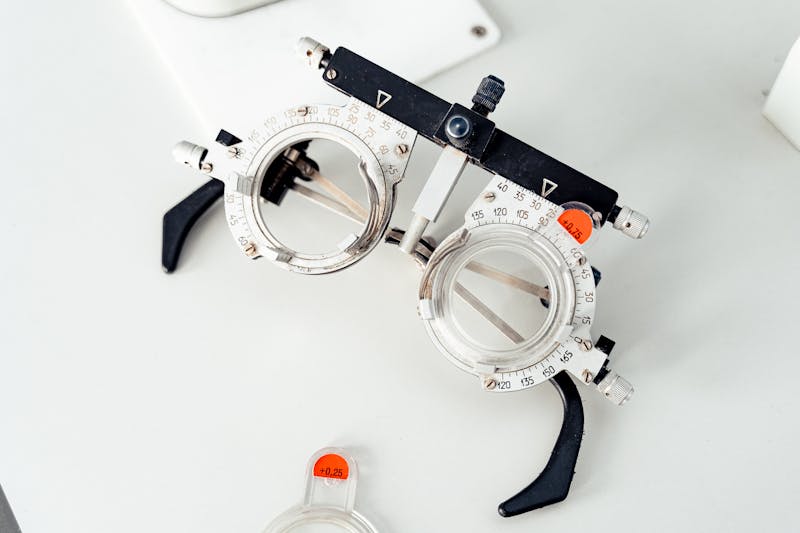Have you ever found yourself squinting at a street sign and wondering when you last visited an optometrist? Perhaps you’ve noticed you get headaches after staring at your laptop for too long. Questions like these often arise once we realise just how important our eyes are for everyday tasks. While many people schedule dentist appointments or general health check-ups like clockwork, they often overlook regular eye check ups until a problem arises.
Yet routine eye care is just as critical. In this blog post, we’ll explore why maintaining good eye health should be top of your priority list. We’ll chat about how eyes work, the early warning signs for common eye conditions, and how a yearly eye exam can impact not only your vision but also your overall wellbeing. By the time you finish reading, you’ll know exactly why regular visits to an optometrist are essential, how often to book them in Australia, and what benefits you can expect for yourself and your family.
So, if you’ve been putting off your next appointment, stick around. We’ll cover plenty of valuable information to help you stay proactive about your eye health. After all, seeing clearly means experiencing the world in the best way possible, both now and in the years ahead.
Understanding the Basics of Eye Health
Every day, our eyes process countless images, colours, and details, allowing us to engage with the world around us. Regular eye check ups help keep this complex system functioning at its best, so it’s worth taking a closer look at how it all works. By understanding the basics, you’ll appreciate how important routine eye care really is.
How Do Our Eyes Work
Think of your eyes as mini cameras that capture light and then send signals to your brain. Light enters through the cornea and lens, which focus the images on the retina. The retina contains cells that translate these images into electrical signals, which then travel along the optic nerve to your brain. It all happens in a blink—literally—allowing you to see actions in real time.
Because our eyes depend on many parts working together, any single issue can throw things off balance. If your cornea is misshapen, you might become short-sighted or long-sighted. If the lens loses its flexibility, you might need reading glasses. If the retina is damaged, you could experience more serious vision loss. That’s why regular eye check ups are so important: they help identify where in this process something might be going wrong.
Common Vision Issues and Early Warning Signs
One of the biggest reasons for routine eye care is catching problems such as astigmatism (blurry vision at multiple distances), glaucoma (pressure-related damage to the optic nerve), and cataracts (clouding of the lens). Early stages might cause hardly noticeable changes in your sight, like minor headaches or subtle blurring. However, as these conditions progress, they can lead to permanent vision loss if not treated.
Sometimes, a simple eye strain might just mean you’ve been working at your computer for too long. But if symptoms persist and you start noticing circles of light (halos) around objects, difficulty seeing at night, or frequent squinting, it’s time to visit an optometrist. Setting regular appointments allows you to spot these critical signs before they escalate.
How Vision Impacts Overall Wellbeing
Good eyesight is vital for so many daily activities, from reading small print on medication labels to driving safely at night. When vision is compromised, it can lead to frustration, fatigue, and difficulty performing day-to-day tasks. Plus, good vision supports cognitive functions, making it easier to concentrate on homework, projects, or even your evening Sudoku puzzle.
On the flip side, improving your visual health can have a ripple effect on your general wellbeing. A simple change in prescription could mean fewer headaches and improved productivity at work. Furthermore, children with corrected vision can better focus in class, boosting their confidence and overall performance. Consequently, committing to regular eye check ups can help you feel more capable in everyday life.

Importance of Routine Eye Care in Australia
Australians lead active lifestyles that often involve bright sunshine, dusty roads, and plenty of outdoor activities. As a result, eyes can face unique challenges like high levels of UV exposure. Knowing what your local healthcare system offers and how to schedule a regular eye check up can make a huge difference in keeping your vision in peak condition.
Are Eye Tests Covered by Medicare or Private Insurance?
A common question for those new to eye care in Australia is whether eye tests are covered under Medicare. Many basic eye examinations are indeed subsidised by Medicare, especially for routine screenings at certain intervals. However, the coverage can depend on factors such as your age and how much time has passed since your last test. Private health insurance can also provide additional rebates for specific treatments or prescription lenses, which might reduce out-of-pocket costs.
If you’re unsure about your entitlement, contact your local optometrist or check your insurance policy. These experts can advise you on what routine eye care services might be partially or fully covered. This way, you can budget for any extra expenses without unpleasant financial surprises.
How Often Should You Schedule a Regular Eye Check-Up?
For healthy adults with no existing vision problems, most optometrists recommend booking a comprehensive eye examination every two years. However, if you already wear glasses, suffer from a chronic condition like diabetes, or have a family history of vision disorders, it’s a good idea to pop in once a year instead.
Children often need more frequent check-ups, especially during their earlier years when their eyes are still developing. Older adults should also consider annual exams because the risk of cataracts, macular degeneration, and other issues can increase with age. Ultimately, talk to your optometrist for tailored advice, as each person’s eyesight is unique.
The Wonders of the Yearly Eye Exam
Having a yearly eye exam isn’t just about updating your prescription. It’s a proactive step that can affect your overall health, quality of life, and long-term wellbeing. Plus, it can help your optometrist catch hidden issues before they become big problems.
Identifying Hidden Eye Conditions Early
Some eye diseases, such as glaucoma and diabetic retinopathy, can creep up without any noticeable signs during their early stages. By the time symptoms become bothersome, the condition might already be advanced. A yearly eye exam, however, can spot these sneaky changes early on through routine tests. This is the essence of preventive eye exam strategies—detecting trouble long before it affects your daily life.
If your optometrist does find an issue, early detection increases the odds of successful treatment. This doesn’t only apply to age-related problems. Even fit, healthy people in their twenties or thirties can have hereditary or lifestyle-related conditions that require periodic monitoring. Hence, the importance of eye care cannot be overstated.
Monitoring Physical Health Through an Eye Exam
Believe it or not, a visit to the optometrist can offer more than just insights into your vision. The eyes are a window to overall wellness. Blood vessels at the back of the eye can show early signs of conditions like hypertension and diabetes. Optometrists may notice unusual changes that suggest you need further testing.
Here in Australia, catching these conditions early can prevent more serious complications down the track. Your optometrist might even recommend you see your GP for further checks. This link between vision and general physical health is yet another reason why a yearly eye exam is so beneficial.
Benefits of Eye Care for Everyday Life
Improving your vision can create a big difference in daily tasks—from reading labels in the supermarket to noticing a friend’s wave across a busy street. Many people don’t realise how much they’ve been struggling visually until they put on a new pair of glasses and everything becomes clearer and brighter.
When your eyes feel comfortable and relaxed, you tend to experience fewer headaches and less eye strain. This translates into better focus at work or school and more energy at the end of the day. In short, investing in routine eye care can amplify your enjoyment of everyday activities, whether you’re navigating city traffic or enjoying a scenic hike.
Conclusion: Taking Charge of Your Eye Health
Summing up, regular visits to an optometrist are about so much more than updating your glasses. They’re a key part of preventive eye exam strategies and can play a huge role in protecting your overall wellness. By keeping track of changes in vision and spotting early warning signs of eye conditions, you’re making a smart investment in your future wellbeing.



